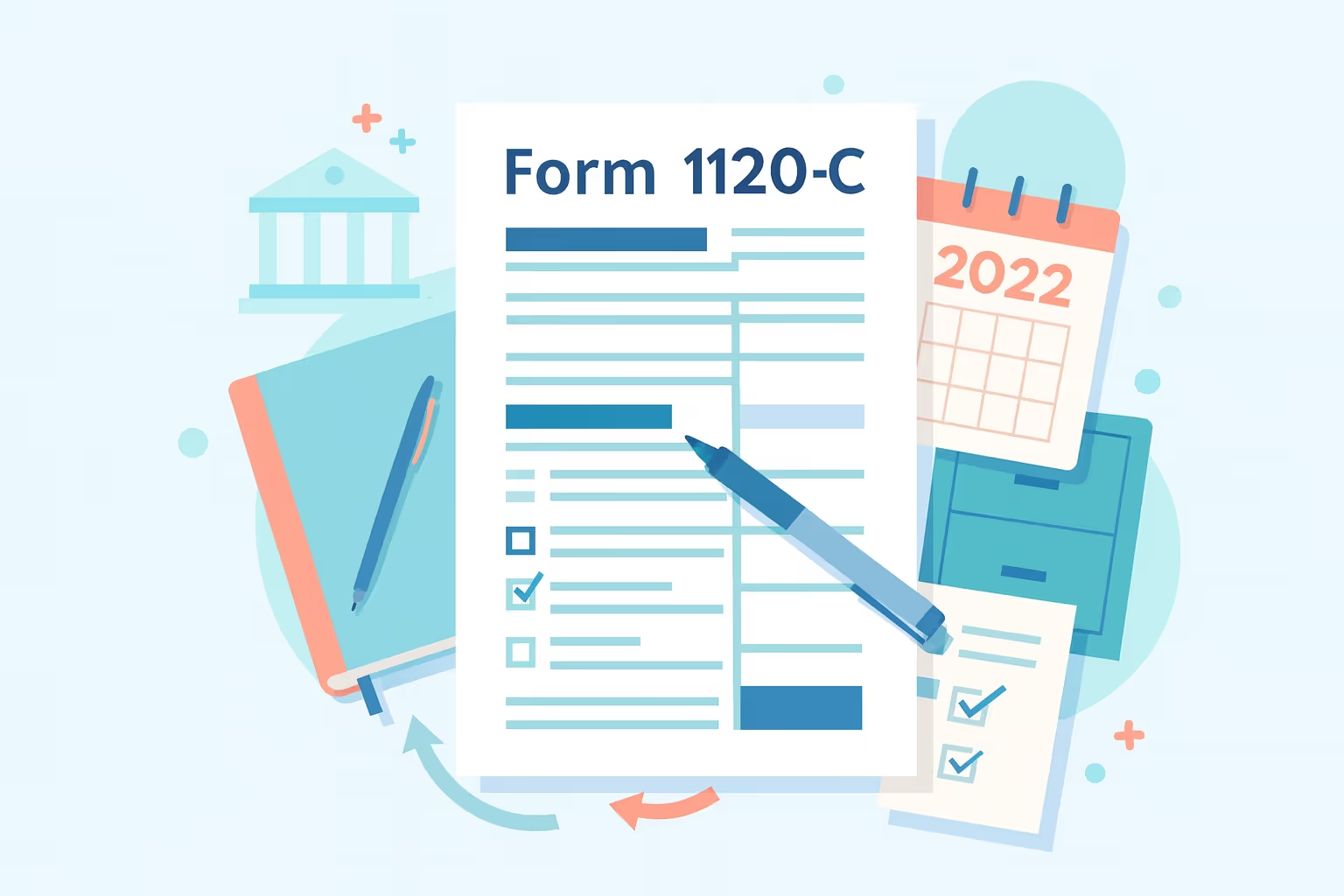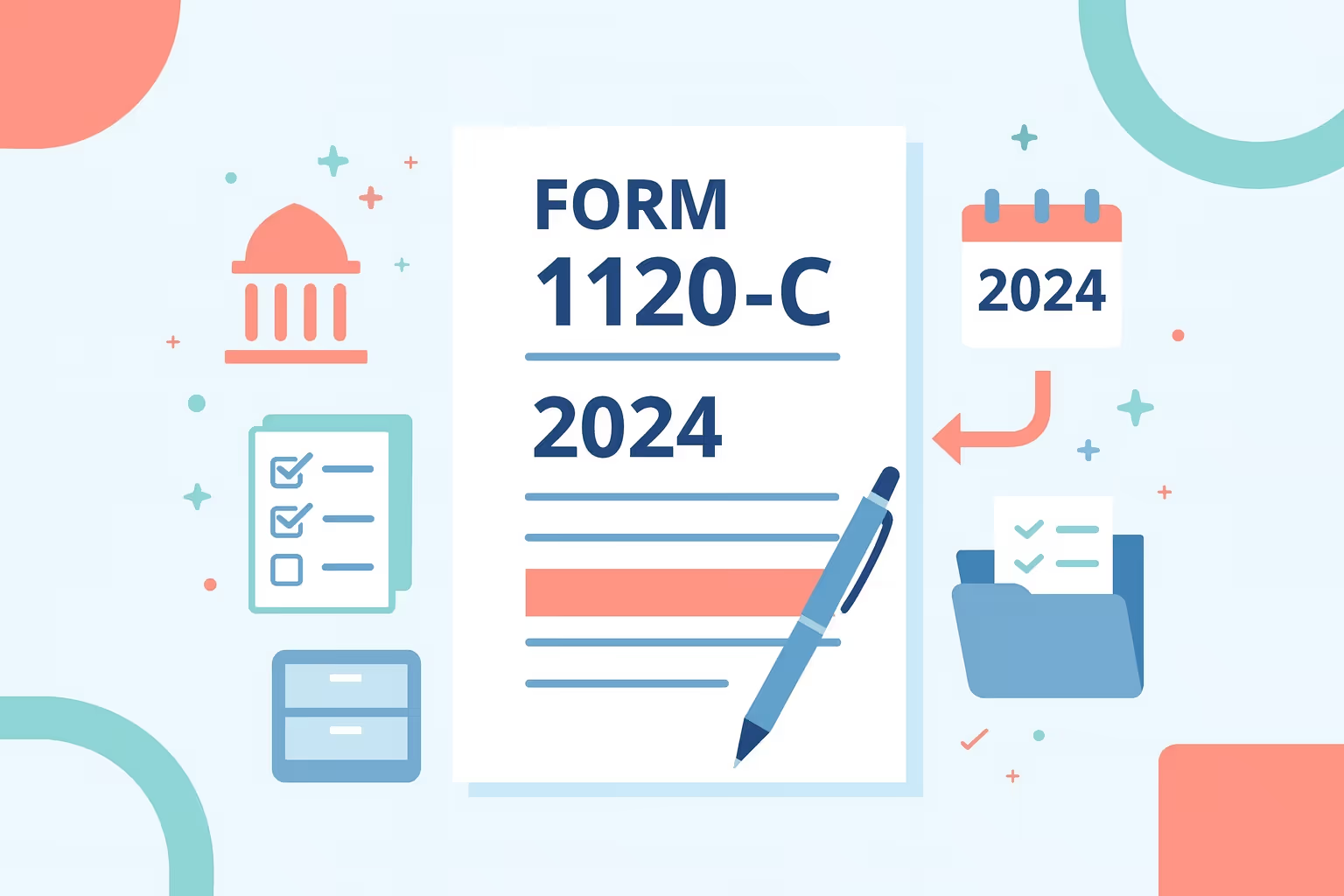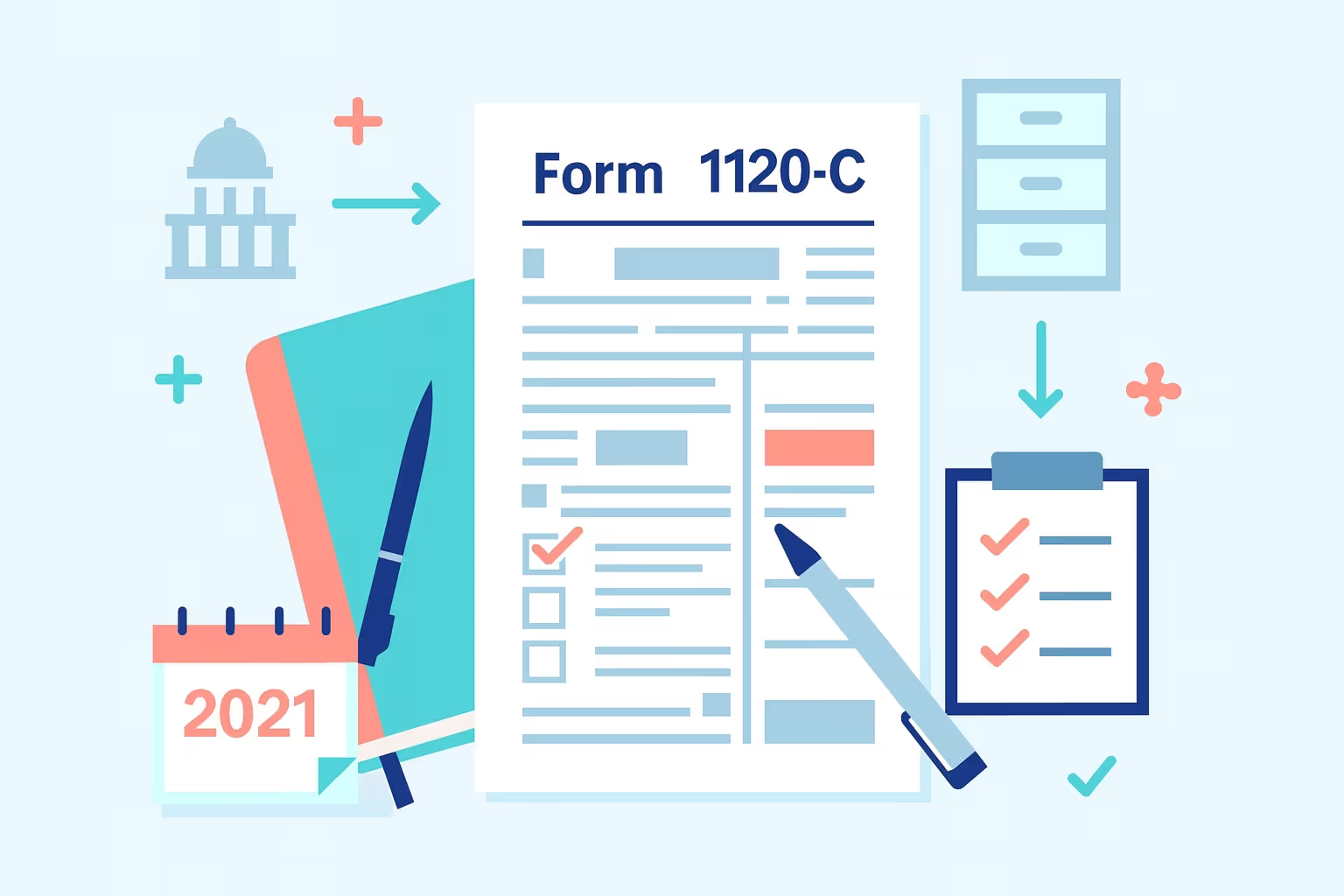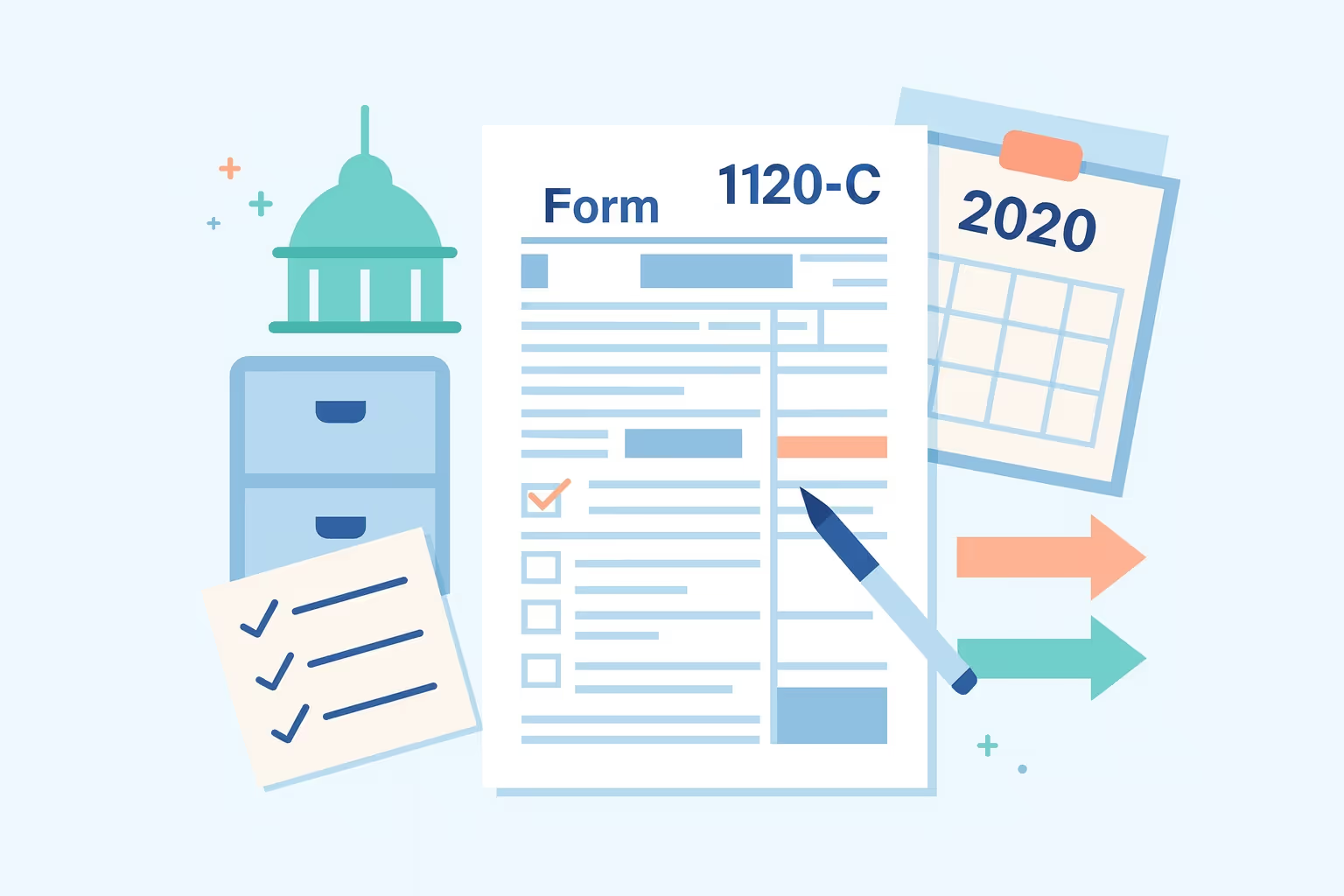
Filing taxes as a cooperative association can be overwhelming, especially when the rules are designed for a particular type of corporation. According to the Internal Revenue Service, the penalty for filing more than 60 days late is at least $450 or the amount of tax due, whichever is smaller. That means even if your cooperative owes little, a missed deadline could still cost hundreds of dollars in penalties. Filing Federal Form 1120-C for tax year 2022 correctly is not optional: it is a legal responsibility.
For cooperative associations, the tax return process is more than recording numbers. It requires dividing income between patronage and non-patronage activities, attaching the proper schedules, and calculating deductions while ensuring compliance with federal tax laws. A simple mistake, such as failing to report income accurately or forgetting to sign the return, can delay processing and create unnecessary scrutiny. These details matter because they directly affect your income tax liability, refund timing, and overall financial stability.
This guide will walk you through the process of filing Form 1120-C step by step. You will see filing requirements, recent IRS updates, deadlines, and the differences between e-filing and paper filing. Practical examples and compliance tips will highlight how to reduce errors, avoid penalties, and make the process smoother. Filing becomes less stressful and more manageable with organized financial records and understanding the rules.
What Is Federal Form 1120-C?
Federal Form 1120 C for tax year 2022 is the U.S. Income Tax Return for Cooperative Associations. It is a specialized tax form issued by the Internal Revenue Service for corporations operating on a cooperative basis under Section 1381 of the Internal Revenue Code. Unlike other corporate returns, this form allows cooperatives to report income, deductions, credits, and their resulting tax liability while distinguishing between patronage and non-patronage income. The form ensures that the taxable income reported aligns with cooperative tax laws and reflects the unique structure of member-driven organizations.
Who Must File Federal Form 1120-C for Tax Year 2022?
Any corporation operating as a cooperative association must file this return. That includes farmers’ cooperatives, rural utility cooperatives, telephone cooperatives serving rural areas, and marketing or supply cooperatives. Both domestic and foreign corporations engaged in cooperative activities fall under this requirement. Even if there is no taxable income for the year, filing the income tax return remains mandatory for most cooperatives.
Cooperative associations filing this tax return must also consider their structure. Some are exempt under Section 521, while others are non-exempt but still required to comply. A C corporation that does not operate cooperatively cannot use this form. Instead, it must file Form 1120 or another applicable tax return form.
Exceptions to Filing
Specific organizations are not required to file Form 1120-C. These include mutual savings banks subject to separate rules, insurance companies governed by Subchapter L, and tax-exempt organizations already covered under Chapter 1. Homeowners' associations also file under different sets of tax laws, not just as cooperative corporations. Understanding these exceptions is essential to ensure compliance and avoid unnecessary paperwork.
Key Updates for Tax Year 2022
The Internal Revenue Service introduced several significant changes that affect how cooperative associations complete Federal Form 1120 C for tax year 2022. These updates influence penalties, available credits, and filing processes. Understanding them is crucial to avoiding mistakes and correctly calculating.
- Increased Penalties for Late Filing: The minimum penalty for filing more than 60 days late rose to $450 or the amount of federal tax due, whichever is smaller. This change emphasizes why filing by the tax deadlines is essential to avoid unnecessary costs.
- Advanced Manufacturing Investment Credit: Cooperatives with qualified investments in advanced manufacturing facilities placed in service after December 31, 2022, may apply this as a deemed payment against total tax. This new credit can lower the amount of income tax liability owed.
- Form 1120-W Became Historical: The corporation estimated tax form, known as Form 1120-W, is now historical. While prior-year minimum tax rules still apply, the Internal Revenue Service no longer updates this form.
- Updated Principal Business Activity Codes: Cooperatives must use the most recent codes when reporting income and business activities. Incorrect codes may delay the tax return.
- COVID-19 Related Payroll Credits: Although most pandemic-related credits expired, cooperatives that paid qualified sick or family leave wages in 2022 for leave taken before October 1, 2021, may still claim these employment credits.
- Corporate Alternative Minimum Tax: Beginning after 2022, the Inflation Reduction Act imposes an alternative minimum tax on certain corporations. While this does not directly affect 2022 filings, it sets the stage for future tax years.
Comparison 1: IRS Changes for Tax Year 2022 vs. Prior Years
Minimum Late Filing Penalty
- Prior Years: $435
- Tax Year 2022: $450
Advanced Manufacturing Investment Credit
- Prior Years: Not available
- Tax Year 2022: Available for qualified investments
Form 1120-W
- Prior Years: Active for estimated tax purposes
- Tax Year 2022: Considered historical only
Business Activity Codes
- Prior Years: Previous IRS code list applied
- Tax Year 2022: Updated IRS codes required
COVID-19 Payroll Credits
- Prior Years: Available broadly to employers
- Tax Year 2022: Limited to wages for leave taken before October 1, 2021
With these updates in mind, the next step is understanding when and how to file your cooperative’s tax return to comply with IRS rules.
Filing Requirements and Deadlines
Filing Federal Form 1120 C for tax year 2022 is not just about filling in numbers but meeting precise deadlines and following IRS filing rules. Cooperative associations that miss the filing date risk penalties, interest, and delays in processing their income tax return.
Whether you are a domestic cooperative or a foreign corporation engaged in cooperative activities, the Internal Revenue Service has set precise filing requirements for this tax return form.
Filing Deadlines Explained
- Calendar-Year Cooperatives: For most cooperatives using a calendar year, the income tax return was due by April 17, 2023 for most cooperatives using a calendar year. This later date reflected the federal holiday schedule, which pushed the regular April 15 deadline forward.
- Fiscal-Year Cooperatives: For entities using a fiscal year ending June 30, the deadline is the 15th day of the third month following the end of the tax year. The deadline for all other fiscal-year cooperatives is the 15th day of the fourth month after the year's close.
- Section 6072(d) Cooperatives: Specific associations have unique deadlines under this section of the Internal Revenue Code, requiring returns by the 15th day of the ninth month after year-end.
Filing Methods
- E-File Submission: Many domestic and foreign corporations can file electronically through IRS-authorized providers. This method reduces the chance of errors, provides instant confirmation, and often results in faster refunds or credits processing.
- Paper Filing: If filing by mail, cooperatives must send the tax return to the appropriate IRS processing center. Domestic entities mail their tax return form to the Ogden, Utah address, while foreign corporations engaged in cooperative activity must use the Ogden P.O. Box for international returns. Private delivery services cannot deliver to P.O. Boxes, so use caution when choosing your method.
Automatic Extensions
- Extension Rules: Filing Form 7004 by the original due date provides a six-month extension to file. However, this extension only applies to the paperwork. Any federal tax owed must still be paid by the original due date to avoid interest and penalties.
- Strategic Tip: Even if you cannot complete the return, submitting the extension request helps avoid late-filing penalties. When requesting an extension, cooperatives should use organized records to estimate their income tax liability.
With deadlines and requirements established, the next step is learning how to complete the form correctly. This begins with gathering the correct financial information and working through each section in order.
Step-by-Step Instructions for Filing Federal Form 1120-C
Completing Federal Form 1120-C for tax year 2022 requires careful preparation and attention to detail. By following a step-by-step process, cooperative associations can ensure that all necessary financial information is included, reducing the risk of errors that might delay processing or trigger penalties.
Preparing to File Federal Form 1120-C
Before starting the form, cooperative officers should organize their financial statements and records. Having everything on hand makes calculating income, deductions, and total tax liability easier.
Checklist of Required Information:
- You will need an Employer Identification Number (EIN) assigned by the IRS. If an EIN has been applied for but has not yet been received, enter “Applied for” with the application date.
- Collect all financial records, including gross receipts, cost of goods sold, and details of dividends or distributions to members.
- Assemble prior year returns and total assets information for comparison. These are crucial for ensuring consistency across tax years.
- Gather balance sheets, financial statements, and supporting documentation for deductions, including officer compensation and charitable contributions.
Completing the Header and Items A–D
- Header Information: Enter the cooperative’s legal name, principal business address, EIN, and the beginning and end of the tax year. This information must match official IRS records.
- Items A–D: These items require details on consolidated returns, cooperative status (exempt or non-exempt), and whether the return is initial, final, or amended. Check the correct boxes since they determine how the IRS processes your tax return.
Reporting Income
Lines 1 through 10 are dedicated to income reporting. Accuracy here directly affects your taxable income and resulting liability.
- Enter gross receipts or sales minus returns and allowances. This establishes the starting point for gross profit.
- Report the cost of goods sold on Form 1125-A, which must be attached if required. This figure is then subtracted from receipts to calculate gross profit.
- Report other income such as dividends, interest, rents, and business income not directly tied to cooperative operations.
- Add these figures to calculate total income, which forms the foundation for taxable income reported on the return.
Reporting Deductions
Lines 11 through 24 allow cooperatives to report deductions that reduce taxable income. Organized records must support these.
- Officer compensation must be reported using Form 1125-E if required.
- Salaries and wages paid to employees should be included, along with adjustments for bad debts and repair expenses.
- Deduct expenses such as rents, taxes, licenses, and business interest expense.
- Include charitable contributions made by the cooperative and depreciation and amortization of assets.
- Remember to account for net operating losses from prior years, which must be applied according to IRS rules.
- Other deductions that apply to your cooperative should be detailed and supported with documentation.
Completing Required Schedules
Several schedules accompany Form 1120-C. Completing them correctly is essential to reflect patronage and non-patronage activity.
- Schedule G: Allocates income and deductions between patronage and non-patronage categories. This schedule directly impacts taxable income and ensures accurate reporting for members.
- Schedule J: Calculates the cooperative’s tax liability, applying the applicable tax rate and including adjustments for credits such as employment or foreign tax credits.
- Schedule K provides additional information about the cooperative, such as its principal business activity code, total assets, and elections made under tax laws.
- Schedule L: Presents balance sheets per books at the start and end of the tax year, reflecting the cooperative’s financial position.
- Schedule M-1 and M-2: Reconcile income and retained earnings per books with taxable income reported on the return.
- Other Forms: Attach Form 1125-E for officer compensation, Form 1125-A for cost of goods sold, Form 4136 for credits related to federal tax paid on fuels, or other forms as required by separate instructions.
Once the form has been accurately completed, the next step is understanding payment procedures, estimated tax rules, and how penalties apply if deadlines or requirements are missed.
Payments, Estimated Tax, and Penalties
Filing Federal Form 1120 C for tax year 2022 is only part of the process. Cooperative associations must also ensure that all federal taxes are paid correctly and on time. Payment rules are strict, and missing deadlines can quickly lead to penalties and interest, increasing your income tax liability.
Federal Tax Payment Requirements
- Electronic Payment System: All federal taxes must be submitted electronically through the Electronic Federal Tax Payment System (EFTPS), bank wire transfers, or ACH methods. These secure systems are required for corporations to help prevent delays.
- Overpayments: If your cooperative has overpayment credited to the following tax year, you can apply it toward future liability. However, this decision should be calculated carefully to ensure you are not underpaying for the current year.
- Confirmation of Payment: Always maintain payment records. The Internal Revenue Service expects corporations to provide proof of timely payment if questioned.
Estimated Tax Payments
Cooperative associations must make quarterly estimated tax payments if they expect to owe $500 or more in total tax for the year. These payments are based on projected net income and are essential for avoiding underpayment penalties.
- Payments are due in the tax year's 4th, 6th, 9th, and 12th months.
- To avoid penalties, you must pay 100 percent of the prior year's minimum tax or 100 percent of the current year's income tax liability.
- Failure to meet these requirements may result in interest charges, which add up quickly and reduce cash flow.
Common Penalties
The IRS imposes strict penalties on cooperatives that do not comply with payment and filing requirements.
- Late Filing Penalty: Returns filed after the tax deadlines are penalized at 5 percent of the unpaid monthly tax, up to a maximum of 25 percent. A minimum penalty of $450 applies for returns filed over 60 days late.
- Late Payment Penalty: If tax is not paid on time, the penalty is 0.5 percent of the unpaid amount per month, up to 25 percent of the total tax.
- Accuracy-Related Penalty: Errors in reporting taxable income, deductions, or credits may result in an additional 20 percent penalty.
After explaining payment rules and penalties, the next important step is to understand the most common filing mistakes and how to ensure compliance when completing Form 1120 C.
Common Mistakes and Compliance Tips
Even when Federal Form 1120 C for tax year 2022 is prepared carefully, errors can still occur. These mistakes often lead to processing delays, penalties, or inaccurate taxable income reported to the Internal Revenue Service. By knowing the most frequent errors, cooperative associations can complete the tax return more accurately and ensure compliance with tax laws.
Filing and Documentation Errors
- Many returns are rejected because they are not completed accurately. For example, leaving blank fields or writing “See Attached” instead of providing required financial information is unacceptable. Each line must contain either an entry or a zero.
- Missing signatures remain a frequent issue. The IRS requires an authorized officer, such as a president or treasurer, to sign the return to be valid.
- Accompanying schedules must be included in the correct order. The IRS may delay processing or request clarification if forms are attached incorrectly.
Allocation and Classification Errors
- Patronage and non-patronage income must be distinguished carefully. Mixing these categories changes taxable income and total deductions, potentially leading to higher liabilities.
- Other deductions and special adjustments should be reviewed for accuracy. If necessary adjustments are missed, taxable income will not reflect the cooperative’s net operating position.
- Net operating losses must be appropriately applied. Some cooperatives fail to carry forward losses according to the Internal Revenue Code, which can cause overpayment or underpayment of federal tax.
Calculation Errors
- Mathematical mistakes, such as rounding inconsistencies, can create discrepancies between total deductions and taxable income. For tax purposes, it is essential to use consistent rounding (all whole dollars or all cents).
- Failure to reconcile book income with the tax return using Schedule M-1 leads to mismatched financial records. This mistake signals to the IRS that financial statements may not align with reported taxable income.
- Ignoring necessary adjustments for depreciation, amortization, or credits reduces accuracy and risks penalties.
By avoiding these mistakes, cooperative associations can save time, reduce stress, and improve accuracy.
Special Filing Situations
Not every cooperative operates consistently from year to year. Some may have no business operational, while others are filing their first return. The Internal Revenue Code still requires many entities to file Federal Form 1120-C for tax year 2022. Knowing how to handle these special situations ensures compliance and reduces unnecessary IRS inquiries.
Zero Activity or Dormant Year Filing
- A cooperative association must still file a return for cooperative associations even when there is zero activity. As long as the cooperative exists under Section 1381, the filing requirement does not disappear.
- The return must include all header information, with zeros entered for income, deductions, and total income lines. Leaving fields blank can cause the Internal Revenue Service to consider the tax return incomplete.
- Balance sheets and financial information may still be required, even if they show no activity. Organized records help prove no financial movement during the tax year.
- If no payments were made, officer compensation and deductions should be shown as zero. This provides clarity and avoids confusion during IRS review.
First-Time Filers
- New cooperatives must check the “Initial Return” box to indicate that this is their first filing of Form 1120 C. This step is crucial for IRS tracking purposes.
- Organized records from the start are essential. Financial statements, member distributions, and patronage records should be detailed to ensure accuracy across future tax years.
- First-time filers benefit greatly from consulting a tax professional. Expert guidance ensures the return is completed accurately and the cooperative’s accounting system is set up correctly for future reporting.
- Correctly classifying activities cooperatively prevents mistakes with taxable income in later years.
The IRS expects accurate information, whether you are filing for the first time or reporting a dormant year. The following section will review resources that cooperative associations can rely on for ongoing support.
Resources for Cooperative Associations
Cooperatives filing Federal Form 1120 C for tax year 2022 do not need to navigate the process alone. Several trusted resources are available to help ensure the return is completed accurately and submitted on time. Using these tools and services reduces errors and improves compliance with IRS requirements.
IRS Resources
- IRS Website: The official IRS website provides current forms, instructions, and filing deadlines. Cooperative associations should always download the latest versions of Form 1120-C and accompanying schedules from this site.
- Publications and Notices: Documents such as IRS Publication 542 (Corporations) and the Paperwork Reduction Act notice provide detailed guidance on tax laws and reporting obligations. Reviewing these before filing helps ensure compliance.
Professional Assistance
- Tax Professional Guidance: Hiring a tax professional familiar with cooperative associations is often the best way to avoid costly mistakes. Experts can interpret complex rules, apply deductions correctly, and handle special situations such as net operating losses.
- Paid Preparer Services: A paid preparer can also electronically file your cooperative’s return, confirm deadlines, and verify that schedules are attached in the correct order. This professional assistance can save time and reduce stress during the filing process.
With resources in place, the last section of this guide addresses the most common questions about filing Form 1120 C for tax year 2022.
Frequently Asked Questions (FAQs)
Do I need to file Federal Form 1120-C if my cooperative had no taxable income?
Yes, under the Internal Revenue Code, most cooperative associations must file a tax return for cooperative organizations even if no taxable income is reported. Farmers’ cooperatives and other exempt associations are specifically required to submit the income tax return regardless of profit or loss. Filing ensures compliance with IRS rules and avoids penalties that may arise if the organization is considered delinquent.
What is the difference between patronage and non-patronage income?
Patronage income comes directly from business done with or for members, while non-patronage income comes from unrelated activities such as investments. Correctly separating these categories is essential when you report income on Federal Form 1120 C for tax year 2022. If the taxable income reported is misclassified, it can change deductions, credits, and the total tax owed to the Internal Revenue Service.
Can a cooperative get an automatic extension for filing Form 1120-C?
Yes, by filing Form 7004 with the Internal Revenue Service by the original due date, a cooperative may receive an automatic six-month extension. This delays the paperwork and does not extend the time to pay federal tax owed. To avoid penalties, any estimated liability must be paid by the regular tax deadlines, even if the return is incomplete.
What penalties apply for late filing or late payment of federal tax?
The IRS charges penalties if the income tax return is late or if the federal tax paid is incomplete. The late filing penalty is generally 5 percent of the unpaid monthly tax, up to 25 percent. The late payment penalty is 0.5 percent per month. Estimated tax payments must meet the prior year minimum tax or current year liability requirements to avoid underpayment penalties.
Can foreign corporations engage in cooperative activity files using Form 1120-C?
Both domestic and foreign corporations operating on a cooperative basis under the Internal Revenue Code must use Form 1120-C. A controlled foreign corporation with cooperative activity may also be required to file. However, standard C corporations that are not cooperatives must instead use Form 1120 or another applicable tax return form. Filing the correct return ensures compliance and prevents unnecessary review by the Internal Revenue Service.
























